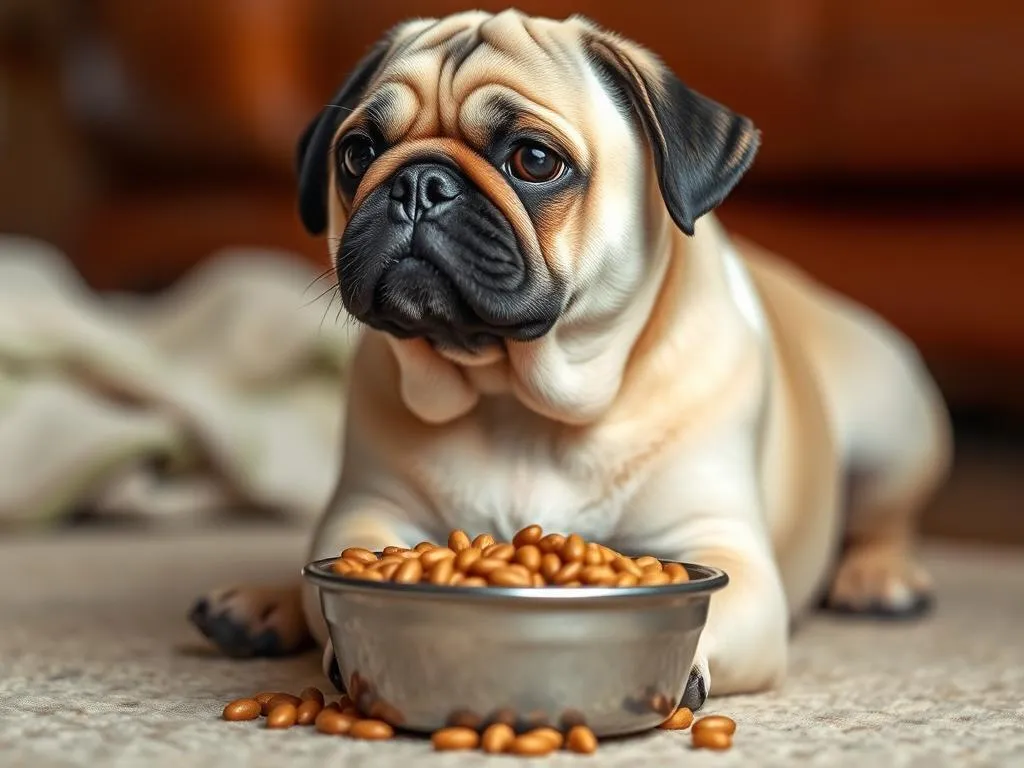
Introduction
Proper dog nutrition is essential for the overall well-being and longevity of your furry friend. Just like humans, dogs require a balanced diet tailored to their specific needs. Among the many breeds, Puggles—a delightful cross between Pugs and Beagles—have unique dietary requirements that must be met to maintain their health. Understanding these needs can guide you in selecting the best dog foods for Puggles.
Understanding Puggles
What is a Puggle?
A Puggle is a hybrid dog breed resulting from the crossbreeding of a Pug and a Beagle. This breed is known for its charming appearance, which includes a wrinkled face, large expressive eyes, and a compact, muscular body. Puggles typically weigh between 18 to 30 pounds and stand about 10 to 15 inches tall. Their friendly and sociable nature makes them excellent companions.
Nutritional Needs of Puggles
Puggles have specific dietary requirements based on their size, age, and activity level. As a medium-sized breed, they need a balanced diet rich in proteins, fats, and carbohydrates. Common health concerns for Puggles include obesity and skin issues, which can be mitigated by providing a well-rounded diet that supports their unique health needs.
Key Nutritional Components for Puggles
Proteins
High-quality protein sources are crucial for Puggles, as they help maintain muscle mass and support overall growth and energy levels. Look for dog foods that list real meat, such as chicken, beef, or fish, as the primary ingredient. Other good protein sources include eggs and legumes.
Fats
Fats play a significant role in providing energy and supporting a healthy coat. Omega-3 and Omega-6 fatty acids are particularly beneficial for skin and coat health. Healthy fat sources for Puggles include fish oil, flaxseed oil, and chicken fat.
Carbohydrates
While dogs are primarily carnivorous, carbohydrates are essential for providing energy and fiber. Fiber aids digestion and helps maintain a healthy weight. Opt for complex carbohydrates like sweet potatoes, brown rice, and oats, which provide sustained energy without causing spikes in blood sugar.
Vitamins and Minerals
Essential vitamins and minerals are vital for a Puggle’s optimal health. Look for a balanced dog food that includes vitamins A, D, and E, as well as minerals like calcium and phosphorus. These nutrients support bone health, immune function, and overall well-being.
Types of Dog Food Options
Dry Dog Food (Kibble)
Kibble is a popular choice for many dog owners due to its convenience and shelf stability. It helps maintain dental health by reducing plaque buildup. When choosing dry dog food for your Puggle, look for brands that offer high-quality protein and healthy fats.
Wet Dog Food
Wet dog food can be advantageous for Puggles, especially those who may struggle with hydration or prefer a more palatable option. It often contains higher moisture content, which can help keep your dog hydrated. Consider brands that use whole ingredients and avoid fillers.
Raw Diet
The raw feeding trend emphasizes a diet consisting of uncooked meat, bones, and organ meats. Proponents argue it mimics what dogs would eat in the wild. However, it’s essential to consult with a veterinarian before transitioning to a raw diet, as it requires careful planning to ensure a balanced intake of nutrients.
Homemade Dog Food
Preparing homemade meals can be a rewarding way to ensure that your Puggle receives high-quality ingredients. However, it’s crucial to follow guidelines for balanced nutrition, including proteins, carbohydrates, and appropriate vitamins and minerals. Simple recipes using cooked chicken, brown rice, and vegetables can be nutritious and delicious.
Top 5 Best Dog Foods for Puggles
Product Reviews
- Royal Canin Pug Adult Dry Dog Food
- Ingredients: Chicken by-product meal, brown rice, corn, and chicken fat.
- Nutritional Analysis: 21% protein, 12% fat.
- Pros: Designed specifically for Pugs, promoting healthy weight and skin.
- Cons: Contains corn, which some dogs may be sensitive to.
-
Price Point: Approx. $50 for a 30-lb bag.
-
Hill’s Science Diet Adult Small Paws Chicken Meal
- Ingredients: Chicken meal, whole grain corn, and barley.
- Nutritional Analysis: 24% protein, 16% fat.
- Pros: Formulated for small breeds, promotes healthy digestion.
- Cons: Some may find the price on the higher side.
-
Price Point: Approx. $60 for a 30-lb bag.
-
Wellness CORE Grain-Free Small Breed
- Ingredients: Turkey, chicken, chicken meal, and peas.
- Nutritional Analysis: 34% protein, 16% fat.
- Pros: Grain-free and high in protein; great for active Puggles.
- Cons: Higher protein content may not suit all dogs.
-
Price Point: Approx. $70 for a 26-lb bag.
-
Blue Buffalo Life Protection Formula Small Breed
- Ingredients: Deboned chicken, brown rice, and barley.
- Nutritional Analysis: 24% protein, 14% fat.
- Pros: Includes LifeSource Bits for antioxidants; no artificial preservatives.
- Cons: Some dogs may not prefer the kibble size.
-
Price Point: Approx. $55 for a 15-lb bag.
-
Taste of the Wild High Prairie Canine Recipe
- Ingredients: Roasted bison, roasted roasted roasted lamb, and sweet potatoes.
- Nutritional Analysis: 32% protein, 18% fat.
- Pros: Unique protein sources and grain-free; great for sensitive stomachs.
- Cons: May be pricier than standard brands.
- Price Point: Approx. $60 for a 28-lb bag.
Comparison Table
| Dog Food Brand | Main Ingredients | Protein | Fat | Price (Approx) |
|---|---|---|---|---|
| Royal Canin Pug Adult | Chicken by-product meal, corn | 21% | 12% | $50 for 30-lb |
| Hill’s Science Diet Small Paws | Chicken meal, corn | 24% | 16% | $60 for 30-lb |
| Wellness CORE Grain-Free | Turkey, chicken, peas | 34% | 16% | $70 for 26-lb |
| Blue Buffalo Life Protection | Deboned chicken, brown rice | 24% | 14% | $55 for 15-lb |
| Taste of the Wild High Prairie | Roasted bison, sweet potatoes | 32% | 18% | $60 for 28-lb |
Feeding Guidelines for Puggles
Portion Control
Proper portion control is vital for maintaining a healthy weight in Puggles. Depending on their age and activity level, adult Puggles typically require around 1 to 1.5 cups of food daily, divided into two meals.
Feeding Schedule
An ideal feeding frequency for Puggles is twice a day. This schedule helps keep their energy levels stable and prevents overeating. Puppies may require more frequent meals, typically three to four times a day.
Special Considerations
For Puggles needing to lose or gain weight, adjusting portion sizes and selecting lower-calorie or higher-calorie dog foods may be necessary. Additionally, senior Puggles may require specialized diets that consider their changing metabolic needs.
Common Dietary Issues in Puggles
Allergies and Sensitivities
Food allergies can manifest in Puggles through symptoms like itching, gastrointestinal upset, and skin irritations. If you suspect your Puggle has a food allergy, consult your veterinarian. Consider trying hypoallergenic dog foods that contain limited ingredients.
Obesity and Weight Management
Obesity is a prevalent issue among Puggles, often leading to serious health complications. To maintain a healthy weight, monitor your dog’s diet closely, limit treats, and ensure regular exercise. Engage your Puggle in daily activities to help burn off excess calories.
Conclusion
Choosing the best dog foods for Puggles is crucial for their health and happiness. A well-balanced diet tailored to their unique needs will promote optimal health and longevity. Always consult with a veterinarian for personalized dietary advice and adjustments based on your Puggle’s individual health status. With the right nutrition, your Puggle can lead a vibrant and fulfilling life.









